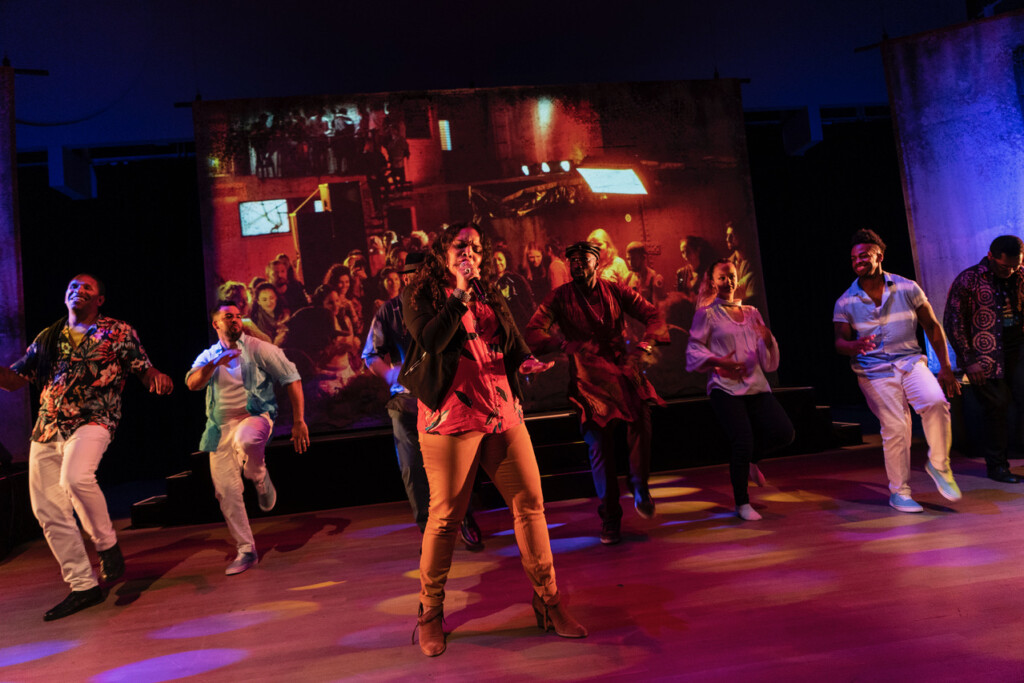We Have Iré, the opener for Cara Mía Theatre’s three-play Latinidades Festival of Latinx Theater (opening Sept. 29), interweaves four unlikely stories in a patchwork of song, dance, and narrative. The jazz and spoken word-inflected performance is centered on the Afro Cuban experience. It traces a fictionalized version of real storylines that seldom take the stage, and in so doing, highlights the festival’s aim to shine a light on facets of Latinidad.
Award-winning jazz composer and musician Yosvany Terry’s life offers one strand in the production he co-created with poet, performance artist, and playwright Paul S. Flores: how Terry left the countryside of Cuba to study jazz in Havana, eventually made his way to the Stanford jazz workshop, and from there to New York, where he found success. He would earn a Grammy nomination and a position as jazz band director at Harvard. The second strand is that of San Francisco-based dancer Ramón Ramos Alayo, who hailed from a remote region of Cuba and was chosen to study dance in Santiago de Cuba at the age of 11.
Third, Oakland hip-hop artist DJ Leydis took a raft from the island nation across the water, losing her way for several days before landing in Miami. She boarded a bus from Miami to the Bay Area, and ultimately became the first Afro Cuban DJ to play in the White House, under Obama. Finally, Flores tells his own story as a Cuban American: “my relationship to feeling connected to the land of my ancestors,” he says, and the way “Cuba lives in me,” particularly through his grandmother, who was born and raised in Havana.
Taken together, they form the backbone of We Have Iré, but also a compelling palimpsest of the Afro Cuban immigrant reality, its richness and multiplicity.
To show such nuance—to stage this work, which was co-produced by Pregones/Puerto Rican Traveling Theater and Flores—underscores Cara Mía’s place on the forefront of the Latinx theater world.
Structurally, the play, directed by Pregones’ Rosalba Rolón, pushes boundaries. The tight, 80-minute metanarrative takes place in one night, during which DJ Leydis is playing a set at a Latin nightclub. As the three other characters interact, the narratives dip into past, present, and future. Unlike any of Flores’s other work, this interwoven structure mirrors tenets of ifá, an Afro Cuban religion that Flores practices in which iré (from the play’s title) refers to a condition of being blessed.
“The idea of talking in the present, the past, and the future all at the same time is a power of ifá,” Flores says. “This is how ifá reveals your destiny to you.” To adopt a similar structure in the script was faithful to its Afro Cuban spirit.
In terms of its set, the mobile production—which premiered in 2019 and had begun to travel the U.S. before the pandemic—involves a simple series of drapes and scrims (suited to travel), and a platform that turns into a boat via projections. The intricate choreography of DJ, band, and dance company involves multiple moving parts: dancers acting, musicians dancing, and actors singing in a swirl of Afro Cuban beats and crescendos.
And, tellingly, the production has funding from some of the leading arts companies in the country, including New York’s Pregones/Puerto Rican Traveling Theater, San Francisco’s Yerba Buena Center for the Arts, Gala Hispanic Theatre in Washington, D.C., San Jose’s MACLA, Miami Light Project, and MECA Houston.
Flores seeks a complexity of perspective.
Certainly, he aims to fill the lacunae of non-Cubans when it comes to empty stereotypes. “I think it’s too black and white when [people] think about Cuba,” he says. “They think communism or they think Miami Cubans.” When he premiered the play, “[some] people didn’t even know there were Black Cubans. That bothered me. I was like, ‘What do you mean?’ You think every Cuban looks like Fidel Castro?’”
But he also sees a blind spot within the Latinx community. “We often don’t focus on the Black part of our community,” he says. “They’re here. They have stories they can tell. And when they open their mouths, some things are gonna come out that you’re not ready for, that you haven’t heard before. And that was part of it. I wanted to shine a light on that. And the nuances of being a political being in the United States.”
One of the narratives that might be overshadowed, for example, is the ocean crossing, which is as defining an immigration tale, though less told, than the desert crossing. “There are very few narratives about people drowning coming across the water,” Flores says. But the water crossing is central in the play.
The language in the bilingual production, too, sets expectations aslant. “It’s Black Cuban Spanish, which has a whole different accent,” Flores says. “It’s very vernacular, very sing-songy. It’s got a gruffness to it that represents the streets in Havana. It’s a new voice people get to hear.”
To bring all of those realities is “to share the larger Latinidad we have in common,” Flores says. “You have to make people aware of that sometimes.”
Such encounters that broaden the notion of Latinidad are the festival’s raison d’être. Later in the cycle, Virginia Grise brings an impassioned manifesto in Your Healing Is Killing Me, and Adrian Villegas incarnates multiple characters in a black box solo comedy show, Barrio Daze, that lays bare political repercussions for Latinos during an election. See them all. They’ll form a primer for some of the most pressing issues in the Latinx community, but also bring in traveling voices, perspectives from elsewhere.
Author







